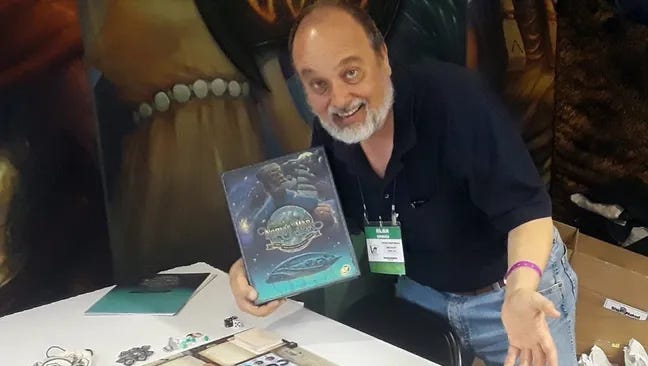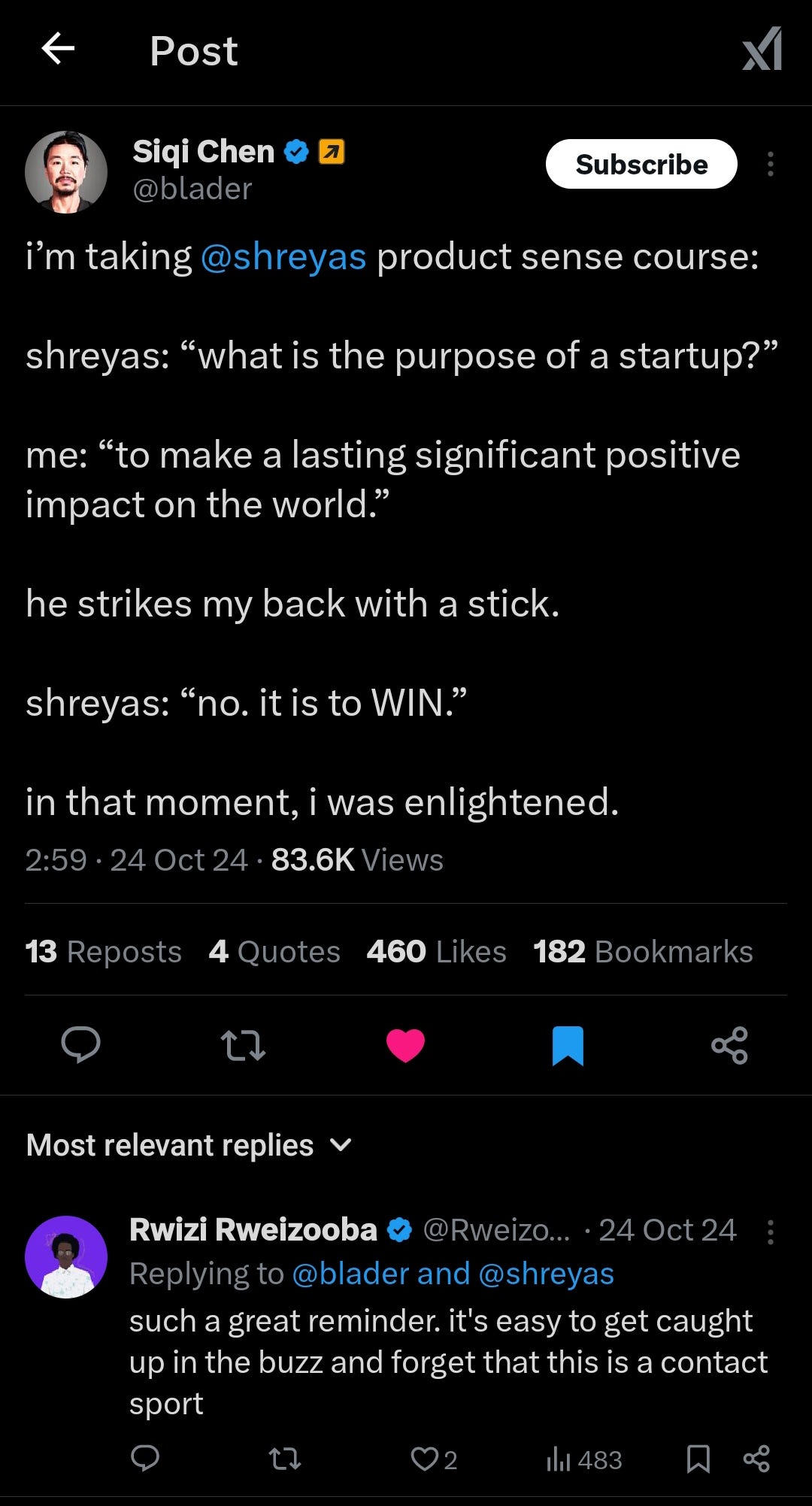Wargaming Weekly #009: What can startup founders learn from this fallen gaming giant?
The 4X Startup or: What Founders Can Learn From Alan Emrich
* THE TOP STORY *
The 4X Startup or: What Founders Can Learn From Alan Emrich
I won’t lie: I didn’t know who Alan Emrich was until a few days ago when I saw the wargaming community sharing news of his passing and paying their tributes (here, here, here, and here).
I have since learned that he was a giant in the world of game design and a bonafide gaming entrepreneur as the founder of boardgame publisher Victory Point Games plus several tabletop gaming conventions. I was especially keen to learn that he coined the “4X” term to describe the subgenre of strategy games in which building an economy matters as much as building an army.… and it has been on my mind since.
You see, Alan Emrich didn't just create a gaming term when he coined "4X" - he captured the essence of what it takes to build something from nothing. While he used it to describe games like Master of Orion, where players build galactic empires, his framework maps perfectly to the journey of building a startup.
Explore
The best founders are explorers first. Before writing a line of code or raising a dollar, they explore their market deeply. They talk to potential customers. They try existing solutions. They look for the gaps and opportunities that others have missed or are simply too lazy (or even better, too proud) to pursue.
But exploration isn't just about market research. It's about exploring the edges of what's possible. Emrich knew that great strategy games let players explore not just map tiles, but possibilities. Similarly, the best startups often come from founders who explore the boundaries of what technology can do.
Founders who skip this phase usually build solutions looking for problems. The ones who explore thoroughly build what people actually need… something people actually want.
Expand
In gaming, expansion means growing from a single colony into an empire. In startups, it means turning your weekend tinkering into a real business.
The key insight here is that expansion isn't just about getting bigger - it's about getting bigger in the right way. In 4X games, expanding too quickly leaves you vulnerable. You need infrastructure to support your growth. The same is true for startups.
When ZIRP-era VC money was still gushing, we saw many founders try to expand before they were ready. They raised too much money, hired too quickly, or entered too many markets at once. The best founders expand methodically, making sure each new step builds on solid ground.
Exploit
This sounds negative, but Emrich meant it in the sense of making the most of your resources. In games, it means developing your territories to their full potential. For startups, it means maximizing every advantage you have.
This advice from product management aficionado Shreyas Doshi (by way of serial entrepreneur Siqi Chen) captures it perfectly:
Still not convinced? See what YC partner Michael Seibel believes the best startups are masters of:
Look, there’s no way around it: building a startup is going to war… and you better be playing to win.
Good founders know their strategic assets and leverage them ruthlessly:
If you have great tech, exploit that advantage before competitors catch up
If you have early users who love you, exploit their willingness to give feedback
If you have hard-won insights about your market, exploit that knowledge to move faster than others
The key is understanding that just like in war, advantages are temporary… often fleeting to be honest. You need to make the most of them while you have them.
Exterminate
In Emrich's games, this meant defeating rival empires. For startups, it means outlasting competitors - not through violence, but through superior execution and strategy.
The brutal truth is that most markets can't support many players.
Here’s what early stage venture capitalist Sarah Guo has to say about this exact topic:
You don't have to literally destroy your competition, but you do need to win decisively in your chosen niche. This might mean capturing key customers, securing crucial partnerships, hiring the best talent, and/or building insurmountable moats.
The best founders understand this reality early. They don't aim to be one of many players in a market - they aim to dominate their chosen space.
The Unsaid X: Execute
Emrich joked about additional X's beyond his core four. For startups, the crucial fifth X is Execute. All the strategy in the world means nothing without relentless execution.
Like the best 4X games, building a startup is about making thousands of small decisions correctly. Each decision might seem minor, but they compound over time. The best founders maintain this attention to detail even as their companies grow.
When Emrich reviewed Master of Orion, he saw beyond the space ships and alien races to the core dynamics that make empire-building games compelling. Similarly, successful founders see beyond the day-to-day chaos to the fundamental patterns of company building.
The 4X framework reminds us that building a startup isn't about following a simple formula. It's about mastering multiple, often conflicting challenges:
Exploring new possibilities while executing on what works
Expanding fast enough to capture opportunity but not so fast you collapse
Exploiting your current advantages while frantically building new ones
Competing fiercely while maintaining focus on your own game
Like the best strategy games, startup success comes from embracing paradoxes masterfully. That's the real lesson from Emrich's framework - and perhaps why it's stood the test of time.
RIP Alan Emrich.
* MORE STORIES *
Games worth noting!
- A Splendid Failure (2021) explores the political dynamics of the American Reconstruction period (designed by Jessa Dury-Agri, Mark Dwyer, and Matthew Kirchman for Georgetown CSS [Source]
- 1983 Pentagon wargame called Proud Prophet, which explores nuclear escalation and its dangerous consequences [Source]
- Exercise STEADFAST FOXTROT was NATO's first ever enablement themed wargame. NATO personnel came together at Joint Support and Enablement Command (JSEC), Ulm, Germany, to put their logistical and enablement strategies to the test in a realistic tabletop scenario. The exercise focused on NATO's options for moving and sustaining forces across vast distances in an article five scenario. The method was a turn based game, featuring custom made cards, chips and maps. NATO commanders were confronted with realistic, complex logistical problems, allowing them to be prepared for any outcome in an uncertain world [Source]
- Joint All Domain Operation (JADO), a Chinese wargame hat focuses on global confrontation operations and multi-service campaigns in the sea, land, air, space and power grid under high-tech conditions in modern warfare [Sources: here and here]
- Operational Combat Series (OCS) games simulate campaign-level combat from 1900 to the mid-1950s [Sources: here, here, here, here, here and here]
- Raiders of the Deep: U-boats of the Great War, 1914-18 is a new game inspired by Gregory Smith's The Hunters: German U-Boats at War, 1939-43 that places the player in command of a German U-boat during WWI [Source]
- Traces of War, a two-player game that simulates the intense fighting between Axis and Soviet forces after the battle of Kursk during August 1943 to March 1944 [Source]
- The Old Prince 1871 is a board game that takes players back to the year 1871, a time of industrial expansion and economic growth [Source]
- Twilight Struggle, a two-player game simulating the forty-five year dance of intrigue, prestige, and occasional flares of warfare between the Soviet Union and the United States [Source]
- NATO Division Commander, a complex wargame based on a hypothetical Soviet invasion of West Germany in the mid -1980's [Source]
- Iwo Jima 1945, Pacific War 1942, and Archie's War: The Battle for Guadalcanal (wargames about US Marines, highlighted by Sebastian Bae) [Source]
Games coming soon!
- Clint Warren-Davey continues playtesting Messiah, his Jesus COIN game [Sources: here and here]
- Clint Warren-Davey continues work on his 7 Wonders-inspired Old Testament game [Sources: here and here]
- Roy Qiao continues playtesting A New Order of Samurai [Sources: here, here and here]
- Roy Qiao continues work on his game, Through the Spring and Autumn [Source]
- Antony continues work on OCS: The Forgotten Battles [Source]
- TO&E editing interface from ORBAT Mapper [Sources: here and here]
- Iwo Jima, a free World War II Print and Play wargame from NEVA Wargames has an upcoming crowdfunding/pre-order campaign [Source]
- The VASSAL module for Sebastian Bae’s Littoral Commander: Baltic wargame will allow players to put together all four maps [Source]
- Episode 2 of the VUCA Simulations podcast is now live with special guest Andoni Orive, giving some insights into his game design New Cold War which is now on preorder [Source]
* BUBBLING IDEAS *
Good game questions:
- “My 7 Wonders-inspired Old Testament game needs a name. I only have one idea so far: Tanakh. The Hebrew word for what Christians call the Old Testament. Any other ideas?” – Clint Warren-Davey
- “Name a better gateway game than Catan. This is not a rhetorical question. I need more games to get my non-gamer friends into board games.” – Clint Warren-Davey
Good game insights:
- “In the current board game market, a play time of 60-90 minutes is the sweet spot.” – Clint Warren-Davey
- “The great thing about being a Wargamer is that the more you work on a wargame, the more you understand nothing.” – Thomas Danger
- “People ask how I became a game designer. Simple - I started making terrible games and kept iterating. Your first prototype will suck. Ship it anyway.” – Justin Gary
- “Reps & sets make proficient soldiers. The same applies to leaders & staff at the bn & bde level, but the complexity makes it harder to practice without sim. Wargaming provides a low-cost, high-impact way to refine decision-making & synchronization skills.” – Alex Buck
- “Wargaming is mental PT, reps & sets at responding to problems. And we need to do more of it at a regular pace.” – Sebastian Bae
- “For those of you who have (or can get) access to IEEE articles I direct your attention to “Large Language Models in Wargaming: Methodology, Application, and Robustness” published in the 2024 IEEE/CVF Conference on Computer Vision and Pattern Recognition Workshops (CVPRW).” - Rocky Mountain Navy Gamer
- “According to the research, men spend several hours each day considering what room they could put a map in, where to get the best stick, and how to initially arrange his soldiers.” – The Babylon Bee
- “in strategy games, buildups look identical whether you're planning to honour alliances or execute betrayals. you build railways, ports, trade networks, you build resource and energy supply & processing pipelines. you build factories churning out cars/tanks/dual purpose tech trees” – jj (@murchiston)
- “A tabletop RPG or wargame is always a simulation because it serves as a model of something else. The presence of more mechanics does not make it more of a simulation, and fewer rules do not make it less of one. In short the word simulation has been misused as a slang term for perceived complication.” – Old School Wargamer
- “Legend of the Five Rings is a rich two player card game where rival clans attempt to destroy each other's strongholds. I love the "fate" mechanic where cards only stay in play with fate tokens on it -- giving a sense of fleeting service. Solid theme and great art.” – Sebastian Bae
- “Many games duplicate mechanisms from other games so even when you play a new game, it can feel familiar. Arcs combines trick taking, resource management, and area control together in a way that doesn’t quite feel like any other game I’ve played.” – J. P. Simons
- “Propaganda raises sweeping questions about framing, staging, and representations of reality, but keeps their scope so constrained that the game becomes one of bluffing rather than representation. Winning at Propaganda is about appearing persuasive, grounding its skillset closer to a party game than a wargame. […] Propaganda raises questions, hard questions, but doesn’t quite know what to do with them on the table.” – Dan Thurot
- “I am a board game design minimalist. I think long and hard about every type of component I include in a game. If I choose to put in cards, they will be doing a lot of the heavy lifting in the game's core engine. If I include tokens or counters, it will be the absolute bare minimum number needed to achieve the effect. Every component needs to be pulling it's weight. I've seen the opposite of this in games and it's a bit annoying. Five different decks of cards when you could probably use 1. Tons and tons of counters, pieces, plastic, etc. Each type of component necessarily brings rules with it. You gotta stick to what is actually essential.” – Clint Warren-Davey
- “Deception is deeply embedded in all human interaction, its use and benefits at all levels of war for millennia has been documented, and it is clearly successfully used in contemporary warfare. Indeed, deception is embedded in modern doctrine and a rich literature of theory and practice is available. Therefore it is not only reasonable but a requirement that serious professional wargaming of all levels of war either incorporates deception or explicitly excludes it for good and stated reasons (for example, understanding logistics is key to warfare, and yet some wargames exclude or approximate logistics in order to focus on other aspects of a problem).” - Stephen Downes-Martin
- Lastly, here’s another great wargaming newsletter to check out: Tuesday Newsday from Armchair Dragoons.
ABOUT THE AUTHOR:
Wargaming Weekly is curated, written and published by Rwizi Rweizooba Ainomugisha, a freelance writer, game designer and startup entrepreneur. Rwizi currently serves as Co-Founder, Co-CEO and Chief Strategy Officer (CSO) at Lupiiya Books - the social finance app that is gamifying the fundraising process for young African entrepreneurs. Wargaming Weekly is a curiosity chronicle of Rwizi’s exploration of the wargaming world… for the love of games in general, for the desire to contribute to the growth of wargaming in particular as a discipline, and lastly, for the hope of finding cutting-edge game design innovations to bring back with him to the startup world.









https://hitchkennedy.substack.com/p/in-memoriam-alan-emrich
You might want to read my remembrance of Alan.